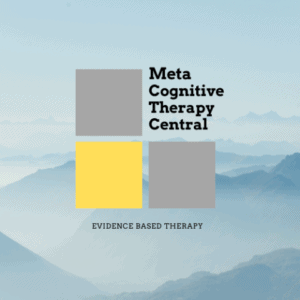
Prior to starting therapy, a portion of my clients have already consumed a lot of information about MCT and tried to apply it on their own. I am always impressed by how much they know, but even with all that MCT knowledge, they still run into the same issues tackling their overthinking as clients who don’t have any prior knowledge of MCT.
Since their difficulty isn’t due to a lack of MCT knowledge, what explains their lack of improvement from self-help MCT, especially when the research about self-help MCT shows good outcomes?
Self-help MCT looks like a promising way to treat anxiety and depression in patients with cardiovascular disease. A recent study showed that at least 56% of these patients improved from anxiety, depression, and PTSD symptoms, but this effect was lower compared with therapist-delivered MCT.
It seems that self-help MCT is helpful when it is part of a research study and consequently practiced systematically and with professional guidance. But does this mean that people can learn to use MCT on their own and recover from mental illnesses? And when is self-help MCT effective for treating anxiety, depression, and OCD, and when should you seek professional help?
Research on Self-help MCT: 240 cardiac rehabilitation patients with elevated anxiety and/or depression received either usual cardiac rehabilitation (CR) or usual CR + self-help MCT. The self-help MCT was based on a manual developed by the founder of MCT, Professor Adrain Wells, and consisted of six modules that focused on reducing worry and rumination and changing metacognitive beliefs that maintain worry and rumination (1).
Is there any MCT self-help manuals available to the public?
Currently, there are no formal self-help MCT manuals available except those used in research trials(1). Some researchers offer free MCT self-help manuals for OCD, however, this treatment is to my knowledge not purely based on MCT principles(4).
The MCT manual Metacognitive Therapy for Anxiety and Depression, created by Professor Wells(5), is a therapist’s guide to treating patients with mental illness and is not suitable for self-help.
The available self-help MCT that I have come across are online training courses created by authors without any formal MCT certification. There are also published books, but these publications have promotional purposes and don’t contain a validated self-help manual that adequately reduces overthinking and challenges biased metacognitive beliefs (steps that are essential for a succesful treatment outcome).
The goal of MCT is to reduce the amount of time you spend worrying about and analyzing your problems because prolonged rumination and worry cause anxiety, depression, and other mental health problems.
When is self-help MCT a good idea?
In the study of self-help MCT made by Wells and his colleagues(1) the patients received professional guidance from trained nurses while completing the course. The study, however, excluded participants with acute suicidality, active psychotic disorders, and participants with current alcohol/drug abuse indicating that severe mental health problems are better suited for face to face therapy.
| Self-help MCT is a good idea | Self-help MCT is not a good idea |
| The treatment sequence is structured and based on a formal evidence-based manual (created or approved by the founder of MCT) | You suffer from severe anxiety, depression, OCD, PSTD |
| Your worry/rumination is mild and you don’t suffer from severe anxiety, depression, OCD, or PTSD | You are suicidal and/or have active psychosis |
| You are willing to follow the treatment sequence from A-Z and complete the full course plus exercises | You are not willing to commit to and complete the full treatment |
It’s important to note that while self-help MCT can be beneficial, it may not replace professional guidance for those dealing with severe mental health issues. Individuals with serious conditions should consult with mental health professionals for comprehensive assessment and treatment.
Who can benefit from self-help MCT?
Recognizable thinking patterns: For those who can identify their patterns of unproductive thinking like persistent worrying, rumination, or catastrophic thinking, self-help MCT can be valuable. MCT is designed to address and modify these unhelpful thinking patterns.
Mild to moderate symptoms: Self-help interventions in general are often more appropriate for those with mild to moderate symptoms rather than severe mental health conditions. If the person’s challenges fall within this range, self-help MCT can offer practical tools for improvement.
Motivation for change: Successful engagement with self-help approaches requires motivation and commitment. Those who are motivated to reduce their unhelpful thinking patterns like rumination and worry and actively seeks self-improvement, self-help MCT can be a suitable option.
Who may not benefit from self-help MCT?
Self-help MCT may not be a good idea for someone dealing with severe anxiety, where it’s hard to go out or manage daily tasks, or for those struggling with severe depression or OCD. In these situations, it’s better to seek help from a professional MCT therapist.
A capable MCT therapist can provide guidance to reduce unhelpful coping behaviors like too much worrying and ruminating, avoiding things, or doing repetitive rituals. They also help challenge false metacognitive beliefs, like for example, that worrying is harmful and beyond control, or that thoughts can cause harm. Unchallenged metacognitive beliefs prevent progress in therapy and increase the risk of future relapse into mental illness.

Can you do MCT on yourself?
Assuming that you have been provided with a structured manual that consists of evidence-based MCT strategies, it is possible to use that to learn to reduce your worries and rumination on your own?
In my experience, those who have a greater chance of succeeding from self-help MCT fully commit to the process as well as understand the core principles of MCT, which are:
Understanding the goal of MCT
An important part of being successful in applying MCT is to understand the goal.
The goal of MCT is to help patients reduce the amount of time they spend overthinking their problems (ruminating and worrying), whether they regard personal, health-related, or social matters. Reducing rumination and worry is however not the same thing as getting rid of unwanted thoughts, which, in my experience, many people tend to have as a goal initially.
Relating to thoughts in a different way
MCT has proven that negative thoughts are not problematic by themselves, and there is therefore no need to spend effort getting rid of them. This is counterintuitive to most people because naturally, we want to get rid of unwanted thoughts. But to successfully apply MCT, it is important to strive to create a different relationship with unwanted thoughts instead of getting rid of them.
Commitment and consistency
Most treatment manuals are built in a specific order which ensures their effectiveness when they are followed meticulously. It is therefore important to resist the temptation to skip ahead and apply the principles loosely, but instead commit to consistent and structured practice just like you would if you were attending therapy.
MCT TIPS on this site are created to help you understand the principles of MCT and familiarize you to the exercises you may come across in treatment. They are therefore not considered official self-help guides.
General research about self-help therapy
Many internet-delivered self-help programs are based on cognitive behavioral therapy (CBT) principles and are often named ICBT. ICBT has proven to be effective in treating various mental disorders, however, ICBT is often combined with professional guidance by a therapist.
Therapist contact as part of self-help seems important and necessary to monitor progress, identify crises, help manage setbacks, or make sure that the treatment is completed. It seems that pure self-help treatment is associated with a higher risk of drop-outs, making therapist guidance necessary for completion.
But although studies have shown that guided self-help is more effective than pure self-help, recent research shows that this may not be the case and that both forms of self-help are equally effective. However, there is a need for more studies to further confirm this.
A recent meta-analysis found that self-help is an effective way of treating anxiety disorders and is as effective as non-specialized psychological treatment for anxiety (treatments that are not based on a specific modality like, for example, CBT or MCT).
There are a few studies that have tested the effect of self-help MCT, with and without therapist guidance. Here is an overview of the most recent ones:
| Study Type | Year of publication | Findings |
| (7)Guided online metacognitive intervention for excessive worry. The study examined if a 10 week simplified online metacognitive intervention can reduce worry | 2021 | The intervention reduced worrying and changed metacognitive beliefs that activate worry. Conclusion from the study: online self-help MCT is a reasonable treatment for reducing excessive worry. |
| (1)Is guided self-help MCT plus cardiac rehabilitation (CR) a good treatment for cardiac rehabilitation patients suffering from anxiety and depression? | 2023 | Conclusion from the study: guided self-help MCT+CR effectively reduces anxiety, depression, and PTSD in patients suffering from cardiovascular disease. The effect from this study was however smaller than other studies testing the effect of regular MCT (56% compared to 74%). |
| (8)Is MCT delivered digitally an effective treatment for cardiovascular patients suffering from anxiety and depression? The self-help treatment was through an MCT app. | 2023 | Conclusion from the study: self-help MCT through an app improved the patient’s psychological health and decreased symptoms of anxiety but not depression. This was a small study and in order to firmly conclude these findings, bigger trials with more people are needed. |
Summary
- Self-help MCT looks like a promising treatment for anxiety and depression, causing improvement in 56% of the patients in a recent study.
- The largest study of self-help MCT included guidance from a professional in the treatment (nurse or therapist).
- Studies testing the effects of pure self-help MCT show good results for treating anxiety but these studies are small and include only a few participants, therefore they should be interpreted with caution.
- There is currently no evidence-based MCT self-help manual available to the public making it difficult to measure the effect of “pure” self-help MCT for people suffering from different mental illnesses.
References
- Wells A, Reeves D, Heal C, Fisher P, Doherty P, Davies L, et al. (2023) Metacognitive therapy home-based self-help for anxiety and depression in cardiovascular disease patients in the UK: A single-blind randomised controlled trial. PLoS Med 20(1): e1004161. https://doi.org/10.1371/journal.pmed.1004161
- Wells, A., & Matthews, G. (1996). Modelling cognition in emotional disorder: The S-REF model. Behaviour Research and Therapy, 34(11-12), 881–888. https://doi.org/10.1016/S0005-7967(96)00050-2
- Haug, Thomas & Nordgreen, T. & Öst, Lars-Göran & Havik, Odd. (2012). Self-help treatment of anxiety disorders: A meta-analysis and meta-regression of effects and potential moderators. Clinical psychology review. 32. 425-45. 10.1016/j.cpr.2012.04.002.
- Moritz S, Jelinek L, Hauschildt M, Naber D. How to treat the untreated: effectiveness of a self-help metacognitive training program (myMCT) for obsessive-compulsive disorder. Dialogues Clin Neurosci. 2010;12(2):209-20. doi: 10.31887/DCNS.2010.12.2/smoritz. PMID: 20623925; PMCID: PMC3181961.
- Wells, A. Metacognitive therapy for anxiety and depression, Guilford press, 2009
- Seewer, N., Skoko, A., Käll, A., et al. Efficacy of an Internet-based Self-help Intervention with Human Guidance or Automated Messages to Alleviate Loneliness: A Three-Armed Randomized Controlled Trial, 27 June 2023, PREPRINT (Version 1) available at Research Square [https://doi.org/10.21203/rs.3.rs-3005279/v1]
- Tove Wahlund, Hugo Hesser, Sean Perrin, Sanna Johansson, Vilgot, Huhn, Sara Sörhus, Severin Lindskog, Eva Serlachius, Erik Hedman-Lagerlöf, Brjánn Ljótsson & Erik Andersson (2021): Therapist-guided online metacognitive intervention for excessive worry: a randomized controlled trial with mediation analysis, Cognitive Behaviour Therapy, DOI: 10.1080/16506073.2021.1937695
- Larionov K, Petrova E, Demirbuga N, Werth O, Breitner MH, Gebhardt P, Caldarone F, Duncker D, Westhoff-Bleck M, Sensenhauser A, Maxrath N, Marschollek M, Kahl KG and Heitland I (2023) Improving mental well-being in psychocardiology—a feasibility trial for a non-blended web application as a brief metacognitive-based intervention in cardiovascular disease patients. Front. Psychiatry. 14:1138475. doi: 10.3389/fpsyt.2023.1138475
